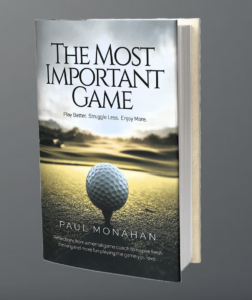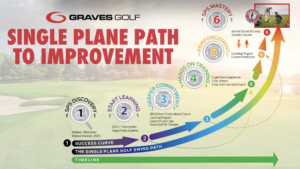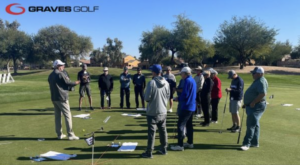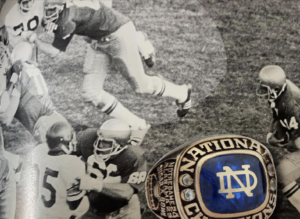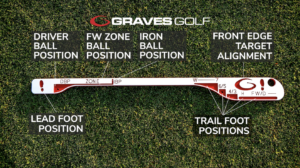By, Paul Monahan, Graves Golf Mental Game Coach
Famous author C.S. Lewis wrote an article in 1948 about how to cope successfully in an “Atomic age.” It was only a few years since the emergence of the first atomic bombs – the entire world was nearly paralyzed with fear over what the future would be like – and whether the human race could survive.
Lewis’ message in his article was meant to help people to gain a little CONTEXT in the midst of a fearful time so that they could live more satisfying lives. He had noticed that the anxiety people were experiencing was debilitating. And so, he urged the reader to think in more objective ways (and ultimately more productive ways) about risk and mortality.
He pointed out that there were lots of risks that people had accepted in their lives – driving in automobiles, living in cites with high crime, coping with sickness and diseases…etc. – and these did not paralyze them. They went on living.
He reminded people that they likely did not have control over whether or not they died in an atomic bomb blast…so why worry about it?
He asked: “Why should living in the atomic age be any different than what they had already been experiencing? Why not just live your life the way you wanted to in the first place?” He implored the reader to: play with your kids, engage in your work and your passions, enjoy your family, and focus on the things you can control. This is what Lewis said would allow you to live life to the fullest.
Easier said than done sometimes. (Like in pandemics, maybe?) But it makes complete rational sense – does it not?
In my experience spending time with performance experts from all over the world and in multiple domains – US Navy Seals, Corporate CEOs, Major League Baseball teams, the NHL, the NBA, Aussie Rules Football, New Zealand Rugby League, Big Wave Surfing, Country Music and even Electronic Gaming just to name a few – I have learned that one of keys to performing at your best in any moment lies in your ability to contextualize.
If you can put your challenges into proper perspective as you move through the day today – engaged in your work, interacting with your spouse, practicing your single plane swing, or playing a round of golf – you will have a much better chance of staying connected to your potential and performing at your best.
Yes. It actually is that simple.
What does contextualizing look like on the golf course?
Instead of berating yourself for the wayward drive off the number one tee box, you accept that miss-hits will happen for you – especially on the first hole. Instead of getting mad about your ball hitting the cart path and bouncing out-of-bounds, you laugh at the unpredictability and variability inherent in the game. And instead of steaming over a missed five-footer, you accept that you may have not yet mastered a successful putting formula from that distance.
But why do we struggle mentally and emotionally on the golf course anyway?
Because we want to WIN. (Or because we just don’t want to LOSE. Same coin, different side.)
( I know many who would say – “I play golf for fun. I don’t need to win.” I get that… But let me tell you: you ARE playing to win… or to NOT lose. You just label it differently. Winning for you is mastering the bunker shot. It’s launching a 4 hybrid to 8 feet on that long par 4. It’s sinking a 30 foot double-breaker. It’s driving past your friends in the center of the fairway. And losing is hitting it out of bounds off the tee box three holes in a row. Losing is three-putting six greens. Losing is hitting a bucket of balls and not hitting ONE ball pure.)
Struggle is technically biological – it shows up when we think we won’t get what we want. (“If I miss this putt, I will lose the momentum going into the last hole…and lose the match!”) Then our survival brain kicks in and the wheels come off of our game. (Amirite?)
So, how’s this for some contextualizing the next time you are in struggle…and stuck on winning/not losing:
There is no such thing as winning or losing. They are illusions. Constructs of our imagination… brought to life through language.

Winning and Losing is what I call The Grand Illusion.
That’s right. And here’s the good news – you never have to worry about winning or losing ever again. Instead, just go play the game the best way you know how today …and accept (even embrace) what happens. Chances are that you will stay much more aware, present and playful …and shoot a lower score because of it.
Think of your golf experiences as just one more step on your journey to single plane swing mastery…without the baggage and meaning of terms like winning and losing. How much calmer mentally and emotionally would that make you?
“But wait, Paul,” you say. “You mean to tell me I should stop thinking about winning? Are you crazy? How am I ever going to win anything with that strategy!!??”
In the world of elite performance, there is AWARENESS of winning and losing, for sure. But the best performers can continually and quickly put all their challenges or disappointments into context. And while inside of their performances they can separate their identity from the concept of winning or losing. Why…because they know that they cannot completely control whether they win or lose.
(One possible exception in golf was Tiger Woods. In the first fifteen years he played on the PGA tour, Tiger Wood’s skills were so far above his peers, that he actually got away with focusing on winning in nearly every moment. He was known to be singularly focused on winning …and he talked about it all the time. But he got away with that because his skills were so much better than his competitors. Read The Big Miss by Hank Haney for more insight into Tiger’s mental game during the 2000’s )
In the past ten years, as his skills have waned, you may have noticed Tiger talking a lot more about the journey – and contextualizing more often. Which is a good thing for him – it keeps him in the game. Otherwise, he would self-destruct due to the struggle that comes from not getting what he wants. These days I believe that Tiger is playing a mental game that more closely matches the rest of the PGA Tour field than at any time in his career. Just a guess…I could be wrong.)
So what is left? Show up and do your best in that moment. Focus on what you can control.
When I played in my club championship earlier this year, I drew a much better player from my flight in the first round. On paper, advancing past this player was a long shot, so I set aside my attachment to winning and focused on what I could control – like how I showed up mentally and emotionally. And how I reacted to what was happening in front of me.
(Yes, for those that have worked with me and heard me talk about this – I DID pour out LOTS of love and positive intentions toward my competitor that day!)
The result: I played 4 strokes better than my handicap, and was tied thru 17 when my opponent pulled off an amazing shot to win on the 18th hole. Losing was not what I wished for. But I was proud that I realized my full potential that day because of how I showed up. And I am a better player today because of what I experienced: focusing on the things I can control – and letting go of the things I cannot.
High performers understand that the thing they want is more likely to show up when they loosen their mental and emotional grip on it. When they “want it a little less.” (Sounds counter-intuitive – I know.)
Moe Norman was very intentional about achieving this level of calm, often saying that his goal was to play with an “alert attitude of indifference.” (At Graves Golf Academy, we conduct an entire two-day playing school based upon this concept!)
As you start a new year – full of promise and potential – I want to encourage you to keep in mind that success in golf and in life comes – in part – from being great at contextualizing…from putting your challenges and setbacks (and achievements) into proper perspective.
And keep in mind that winning and losing is an illusion that you need not fall prey to!
-Paul

